分類 B 9.10.0.1―1―4
【秘】
国際連盟婦人児童売買調査委員の日本に
関する報告書に対する帝国政府意見書
拝啓
一九三二年八月八日付貴翰、拝受候ふところ、これに対する帝国政府の意見書、別紙をもって送付に及び候ふ間、御了承相成りたく、この段、貴意を得候ふなり。 敬具
年 月 日
日本帝国政府
代表栗本庸勝
国際連盟
東洋に於ける婦人児童実地調査委員長
ベスコム・ジョンソン博士殿
一、第一頁、一般報告 (一) 条約への加盟と中央官庁の欄に於て、ただし一九二一年の条約は朝鮮、台湾等の殖民地および関東租借地にはこれが適用なき旨、記載しあるも、帝国は一九二五年十月二十一日、一九一〇年醜業を行はしむるための婦女売買禁止の国際条約に加入したる際、その第十一条第一項にいふ、本条約をその殖民地に実施するにつき特別の意思を通告したることなし。即ち、一九二一年の条約のみならず、一九〇四年の国際協定ならびに一九一〇年の国際条約は、内地にのみこれが適用ありて、朝鮮、樺太、台湾等の殖民地ならびに南洋委任統治地域および関東租借地にはこれが適用なきものとす。
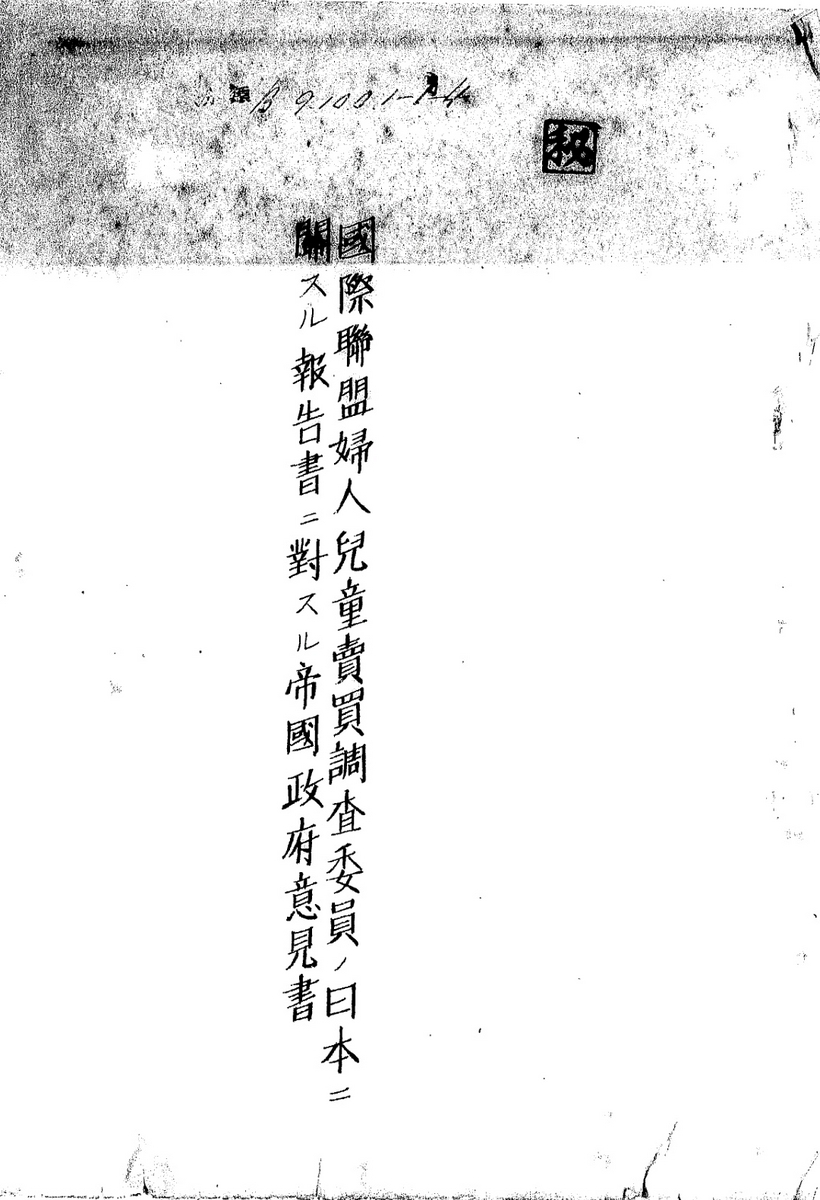
分類 B 9.10. 0. 1―1―4
【秘】
國際聯盟婦人兒童賣買調査委員ノ日本二
關スル報告書ニ對スル帝國政府意見書

拜啓
一九三二年八月八日附貴翰拜受候處之に對する帝國政府の意見書別紙を以て及送付候間御了承相成度此段得貴意候也 敬具
年 月 日
日本帝國政府
代表栗本庸勝
國際聯盟
東洋に於ける婦人児童實地調査委員長
ベスコム・ジョンソン博士殿

−1−
一、第一頁、一般報告 (一) 條約への加盟と中央官廳の欄に於て、但し一九二一年の條約は朝鮮、臺湾等の殖民地及関東租借地には之が適用なき旨記載しあるも、帝國は一九二五年十月二十一日、一九一〇年醜業を行はしむるための婦女賣買禁止の國際條約に加入したる際其の第十一條第一項に謂ふ本條約を其の殖民地に實施するに付特別の意思を通告したることなし。即ち一九二一年の條約のみならず一九〇四年の國際協定並に一九一〇年の國際條約は内地にのみ之が適用ありて、朝鮮、樺太、臺湾等の殖民地並に南洋委任統治地域及關東租借地には之が適用なきものとす。
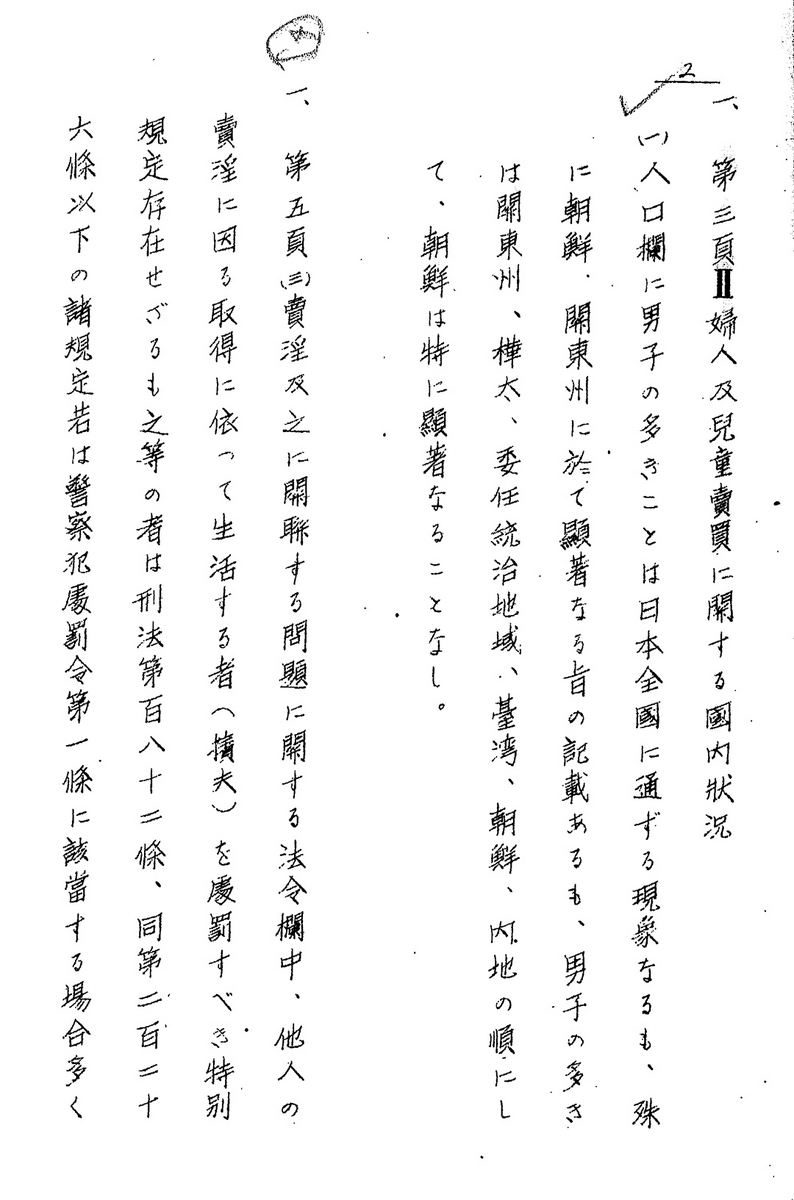
−2−
一、第三頁Ⅱ婦人兒童賣買に関する國内狀況
(一) 人口欄に男子の多きことは日本全國に通ずる現象なるも、殊に朝鮮、関東州に於て顯著なる㫖の記載あるも、男子の多きは関東州、樺太、委任統治地域、䑓湾、朝鮮、内地の順にして、朝鮮は特に顯著なることなし。
一、第五頁 (三) 賣淫及之に關聨する問題に關する法令欄中、他人の賣淫に因る取得に依つて生活する者(擯夫)を䖏罰すべき特別規定存在せざるも之等の者は刑法第百八十二條、同二百二十六條以下の諸規定若は警察犯䖏罰令第一條に該當する場合多く

−3−
從て多数の擯夫は之等諸規定に依り制裁を受く、之等諸規定は既に國際聨盟への報告若は昨年貴委員に對する回答書中に於て報告せる所なるも尚参考の爲警察犯䖏罰令第一條を掲ぐれば左の如し、尚第十一頁擯夫に關する記載に付ては本令に基く䖏罰件数が年々相當数に上ることを注意せんと欲す。
内務省令警察犯䖏罰令第一條
左の各號ノ一ニ該當スル者ハ三十日未満ノ拘留ニ䖏ス
二、密売淫ヲ爲シ若ハ其ノ媒合容止を爲シタル者



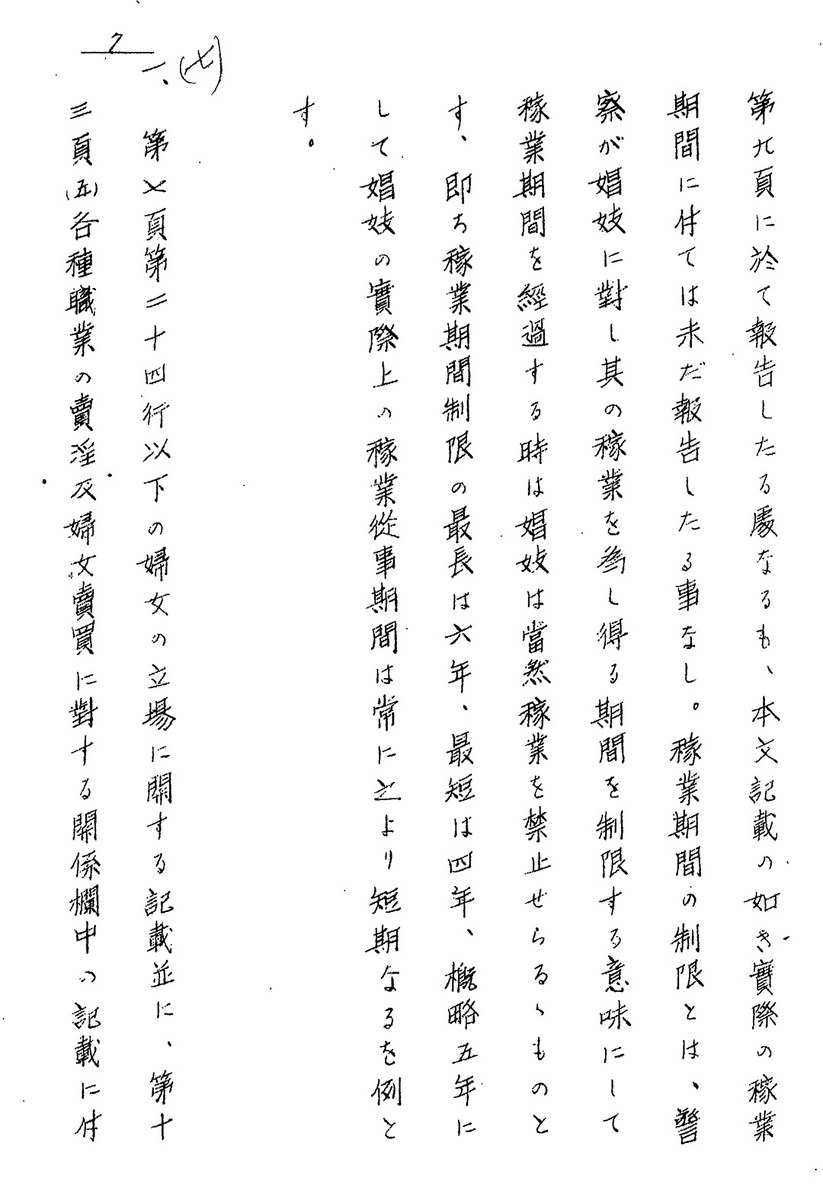
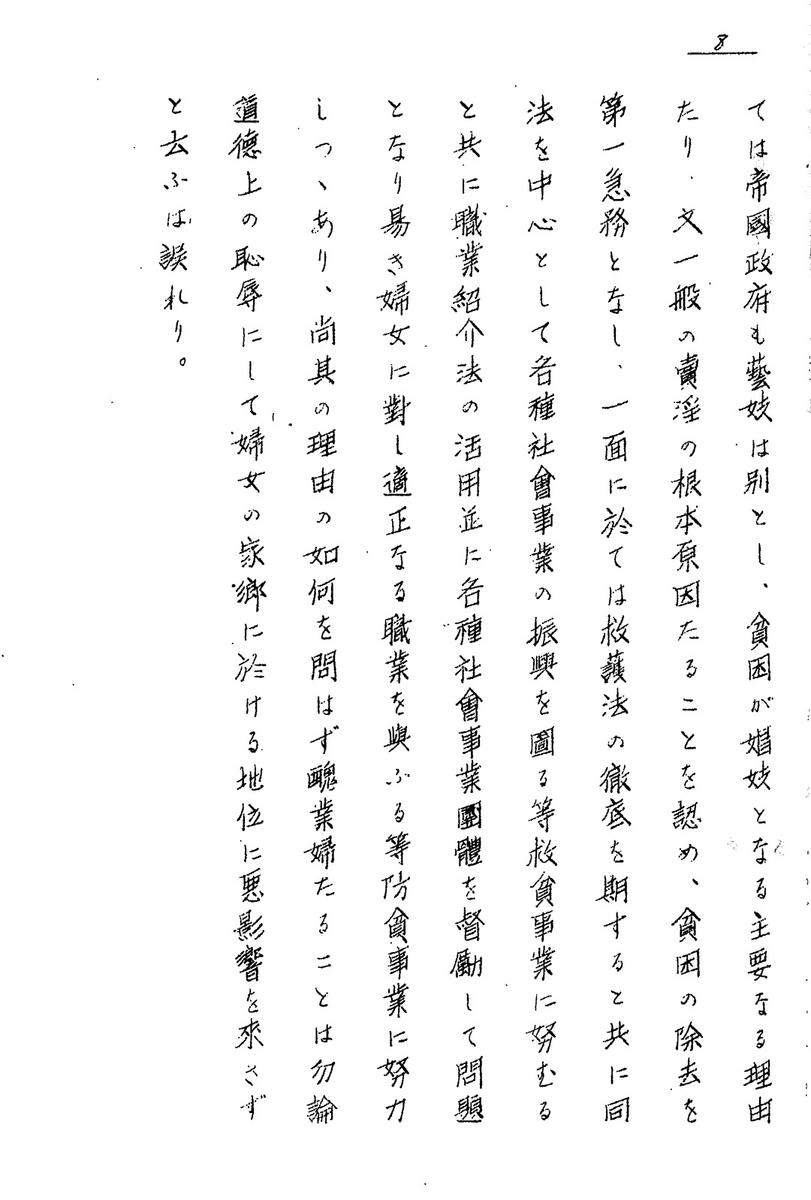


(分類 B. 9. 10. 0. 1−1−4)
OBSERVATION
OF
THE IMPERIAL GOVERNMENT OF JAPAN ON THE REPORT
CONCERNING
JAPAN OF THE LEAGUE OF NATIONS COMMISSION
OF ENQUIRY INTO THE TRAFFIC IN WOMEN
AND CHILDREN IN THE EAST.
JAPANESE GOVERNMENT
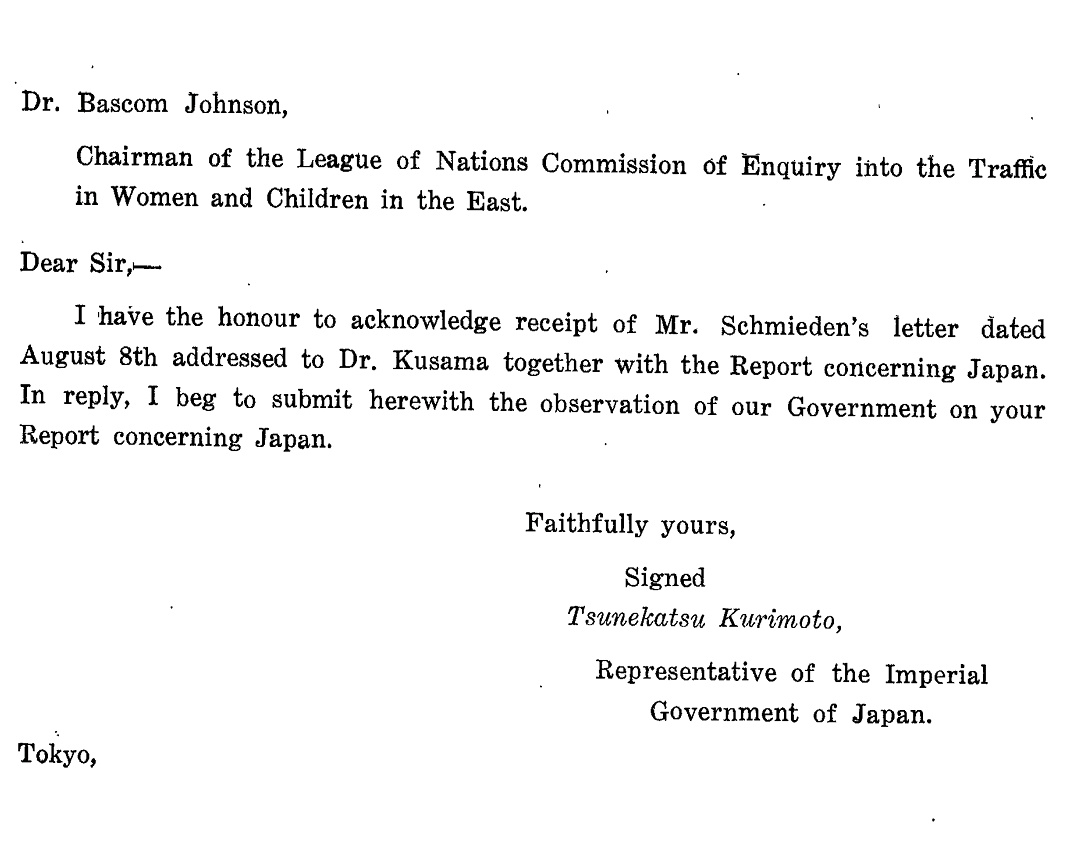
Dr. Bascom Johnson,
Chairman of the League of Nations
Commission of Enquiry into the Traffic
In Women and Children in the East.
Dear Sir, ―
I have the honour to acknowledge receipt of Mr. Schmieden's letter dated August 8th addressed to Dr. Kusama together with the Report concerning Japan. In reply, I beg to submit here with the observation of our Government on your Report concerning Japan.
Faithfully yours,
Signed
Tsunekatsu Kurimoto,
Representative of the Imperial
Government of Japan.
Tokyo,
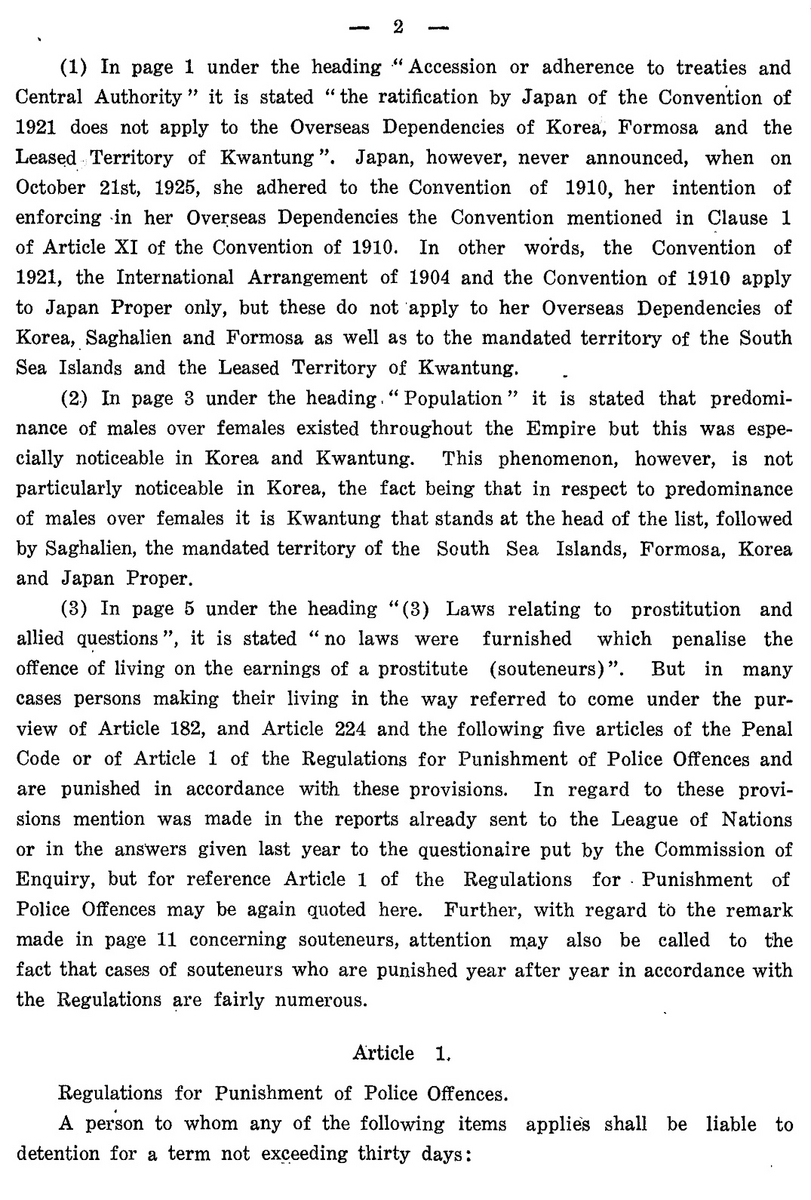
― 2 ―
(1) In page 1 under the heading “Accession or adherence to treaties and Central Authority” it is stated “the ratification by Japan of the Convention of 1921 does not apply to the Overseas Dependencies of Korea, Formosa and the Leased Territory of Kwantung”. Japan, however, never announced, when on October 21st, 1925, she adhered to the Convention of 1910, her intention of enforcing in her Overseas Dependencies the Convention mentioned in Clause 1 of Article XI of the Convention of 1910. In other words, the Convention of 1921, the International Arrangement of 1904 and the Convention of 1910 apply to Japan Proper only, but these do not apply to her Overseas Dependencies of Korea, Saghallen and Formosa as well as to the mandated territory of the South Sea Islands and the Leased Territory of Kwantung.
(2) In page 3 under the heading “Population” it is stated that predominance of males over females existed throughout the Empire but this was especially noticeable in Korea and Kwantung. This phenomenon, however, is not particularly noticeable in Korea, the fact being that in respect to predominance of males over females it is Kwantung that stands at the head of the list, followed by Saghalien, the mandated territory of the South Sea Islands, Formosa, Korea and Japan Proper.
(3) In page 5 under the heading (8) Laws relating to prostitution and allied questions”, it is stated “no laws were furnished which penalise the offence of living on the earnings of a prostitute (souteneurs)”. But in many cases persons making their living in the way referred to come under the purview of Article 182, and Article 224 and the following five articles of the Penal Code or of Article 1 of the Regulations for Punishment of Police Offences and are punished in accordance with these provisions. In regard to these provisions mention was made in the reports already sent to the League of Nations or in the answers given last year to the questionaire put by the Commission of Enquiry, but for reference Article 1 of the Regulations for Punishment of Police Offences may be again quoted here. Further, with regard to the remark made in page 11 concerning souteneurs, attention may also be called to the fact that cases of souteneurs who are punished year after year in accordance with the Regulations are fairly numerous.
Article 1.
Regulations for Punishment of Police Offences.
A person to whom any of the following items applies shall be liable to detention for a term not exceeding thirty days:

−3−
2. A person who has engaged in clandestine prostitution or pandered and let his or her house for immoral purposes.
(4) In page 6 under the heading "(a) Brothels" and again in page 11 under the heading "(f) Barter and sale of children", statements are made to the effect that the parents of a prospective prostitute and a brothel-keeper enter into contract hy themselves, the former being advanced money by the latter. In practice, however, contract for debt is directly entered into by the girl and brothel-keeper and though the parents of the girl often stand surety for the debt, they are not the parties to the contract. The same is the case with geisha.
Further, in page 6 it is stated "sometimes at high rates of interest", but as the result of strict supervision of authority, there is no such case in which the proprietor takes high interest.
(5) In pages 6 and 7 under the heading "(a) Brothels", a statement is made to the effect that the police often bring pressure to bear on prostitutes desiring to give up their calling on their own free will. With reference to this state- ment it is the desire of the Government of Japan to assert that it is contrary to the facts. Not only in form but in spirit, the Government has been and is strictly enforcing the Regulations for the Control of Licensed Prostitutes ever since they were promulgated in 1900.
In order that they be strictly enforced the Central Government has fre- quently issued instructions and circulars to the prefectural authorities enjoining them to supervise the local police with great vigour, so that the latter might not bring in any way undue pressure on those unfortunate women who desire to abandon their shameful calling. It is true that for some time soon after the promulgation of the regulations referred to, cases of the police having caused such women and their parents or relatives to consult among themselves or of having summoned to the offices brothel-keepers, occurred on a few occasions. But as the result of the above mentioned measures for the strict enforcement of the Regulations, there have occurred during the past quarter of a century or so no cases in which the police brought any undue pressure to bear on licensed prostitutes desiring to retire on their own free will. Our government cannot consent to the plea made in the Report on behalf of the police in this connection and to the remark in the same page stating "if prostitutes were, in fact, granted unrestricted retirement..." It must, however, be admitted that as stated in page 21 and the following page of the "Investigation concerning Licensed Prostitution" which was submitted to the Commission of Enquiry in June of last year, when a licensed prostitute desires to abandon her trade before she
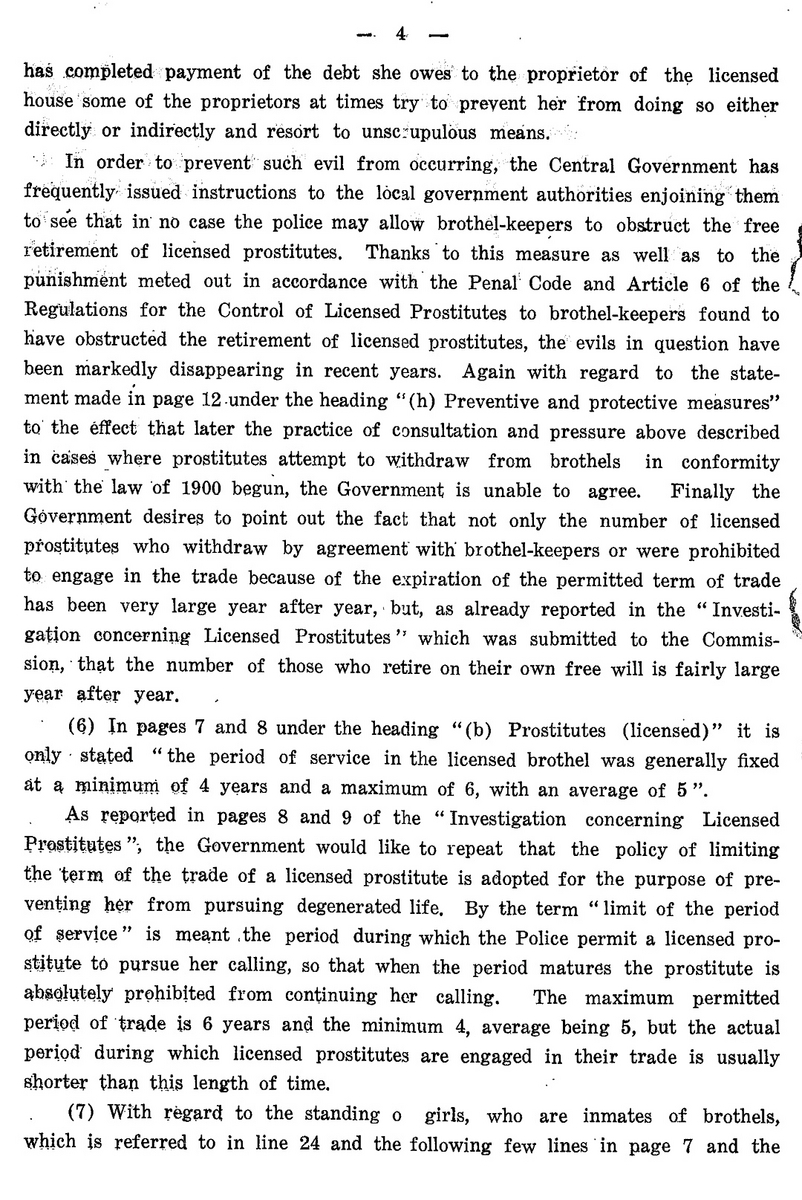
−4−
has completed payment of the debt she owes to the proprietor of the licensed house some of the proprietors at times try to prevent her from doing so either directly or indirectly and resort to unscrupulous means.
In order to prevent such evil from occurring, the Central Government has frequently issued instructions to the local government authorities enjoining them to see that in no case the police may allow brothel-keepers to obstruct the free retirement of licensed prostitutes. Thanks to this measure as well as to the punishment meted out in accordance with the Penal Code and Article 6 of the Regulations for the Control of Licensed Prostitutes to brothel-keepers found to have obstructed the retirement of licensed prostitutes, the evils in question have been markedly disappearing in recent years. Again with regard to the state- ment made in page 12 under the heading "(h) Preventive and protective measures" to the effect that later the practice of consultation and pressure above described in cases where prostitutes attempt to withdraw from brothels in conformity with the law of 1900 begun, the Government is unable to agree. Finally the Government desires to point out the fact that not only the number of licensed prostitutes who withdraw by agreement with brothel-keepers or were prohibited to engage in the trade because of the expiration of the permitted term of trade has been very large year after year, but, as already reported in the "Investi- gation concerning Licensed Prostitutes" which was submitted to the Commis- sion, that the number of those who retire on their own free will is fairly large year after year.
(6) In pages 7 and 8 under the heading "(b) Prostitutes (licensed)" it is only stated "the period of service in the licensed brothel was generally fixed at a minimum of 4 years and a maximum of 6, with an average of 5 ^ prime prime.
As reported in pages 8 and 9 of the "Investigation concerning Licensed Prostitutes", the Government would like to repeat that the policy of limiting the term of the trade of a licensed prostitute is adopted for the purpose of pre- venting her from pursuing degenerated life, By the term "limit of the period of service" is meant the period during which the Police permit a licensed pro- stitute to pursue her calling, so that when the period matures the prostitute is absolutely prohibited from continuing her calling. The maximum permitted period of trade is 6 years and the minimum 4, average being 5, but the actual period during which licensed prostitutes are engaged in their trade is usually shorter than this length of time.
(7) With regard to the standing o girls, who are inmates of brothels, which is referred to in line 24 and the following few lines in page 7 and the
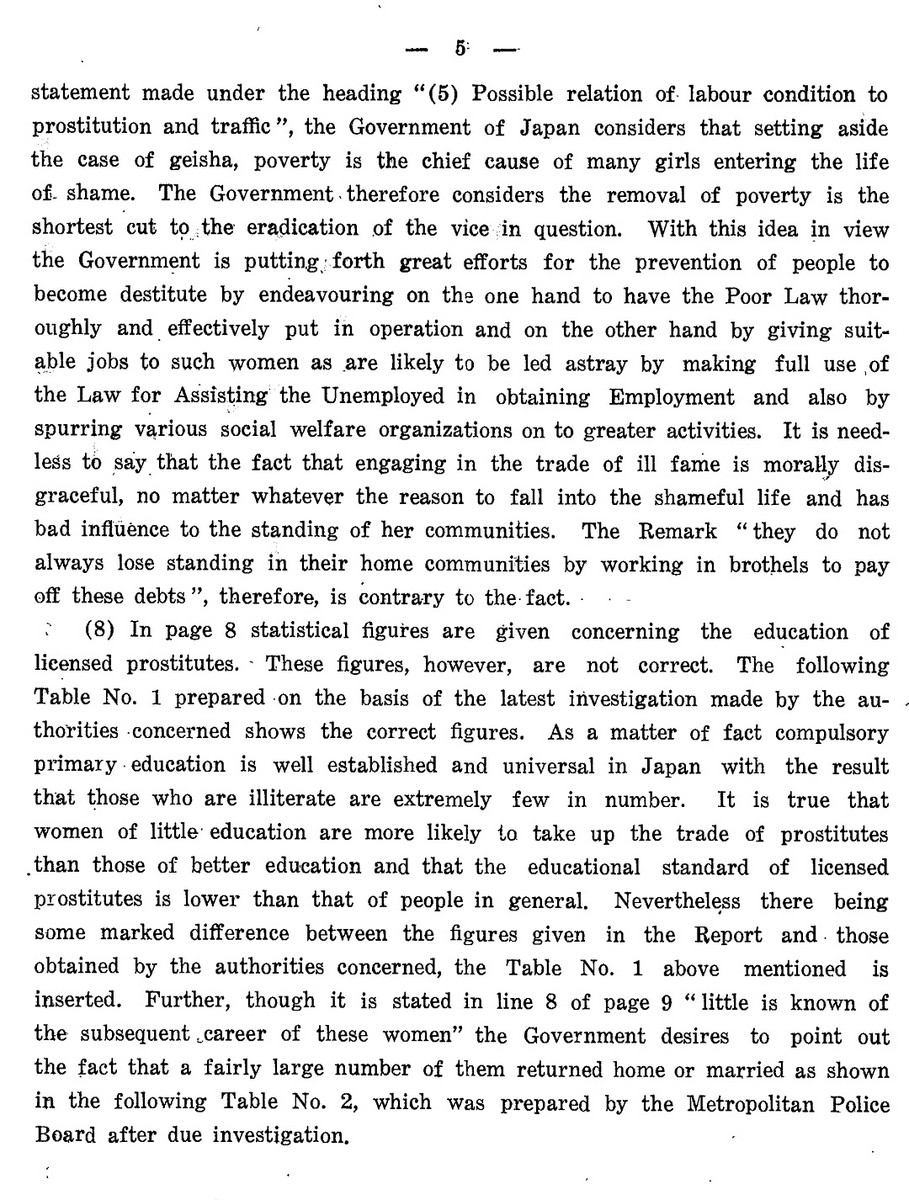
−5−
statement made under the heading "(5) Possible relation of labour condition to prostitution and traffic", the Government of Japan considers that setting aside the case of geisha, poverty is the chief cause of many girls entering the life of shame. The Government therefore considers the removal of poverty is the shortest cut to the eradication of the vice in question. With this idea in view the Government is putting forth great efforts for the prevention of people to become destitute by endeavouring on the one hand to have the Poor Law thor- oughly and effectively put in operation and on the other hand by giving suit- able jobs to such women as are likely to be led astray by making full use of the Law for Assisting the Unemployed in obtaining Employment and also by spurring various social welfare organizations on to greater activities. It is need- less to say that the fact that engaging in the trade of ill fame is morally dis- graceful, no matter whatever the reason to fall into the shameful life and has bad influence to the standing of her communities. The Remark "they do not always lose standing in their home communities by working in brothels to pay off these debts", therefore, is contrary to the fact.
(8) In page 8 statistical figures are given concerning the education of licensed prostitutes. These figures, however, are not correct. The following Table No. 1 prepared on the basis of the latest investigation made by the au- thorities concerned shows the correct figures. As a matter of fact compulsory primary education is well established and universal in Japan with the result that those who are illiterate are extremely few in number. It is true that women of little education are more likely to take up the trade of prostitutes than those of better education and that the educational standard of licensed prostitutes is lower than that of people in general. Nevertheless there being some marked difference between the figures given in the Report and those obtained by the authorities concerned, the Table No. 1 above mentioned is inserted. Further, though it is stated in line 8 of page 9 "little is known of the subsequent career of these women" the Government desires to point out the fact that a fairly large number of them returned home or married as shown in the following Table No. 2, which was prepared by the Metropolitan Police Board after due investigation.
↑「分割2」 JACAR(アジア歴史資料センター) Ref.B04122147000、国際連盟婦人児童問題一件/東洋ニ於ケル婦女売買実施調査ノ件/東洋ニ於ケル婦女売買実地調査ノ件(本邦関係調査報告書並帝国意見書)(B-9-10-0-1_1_4)(外務省外交史料館)